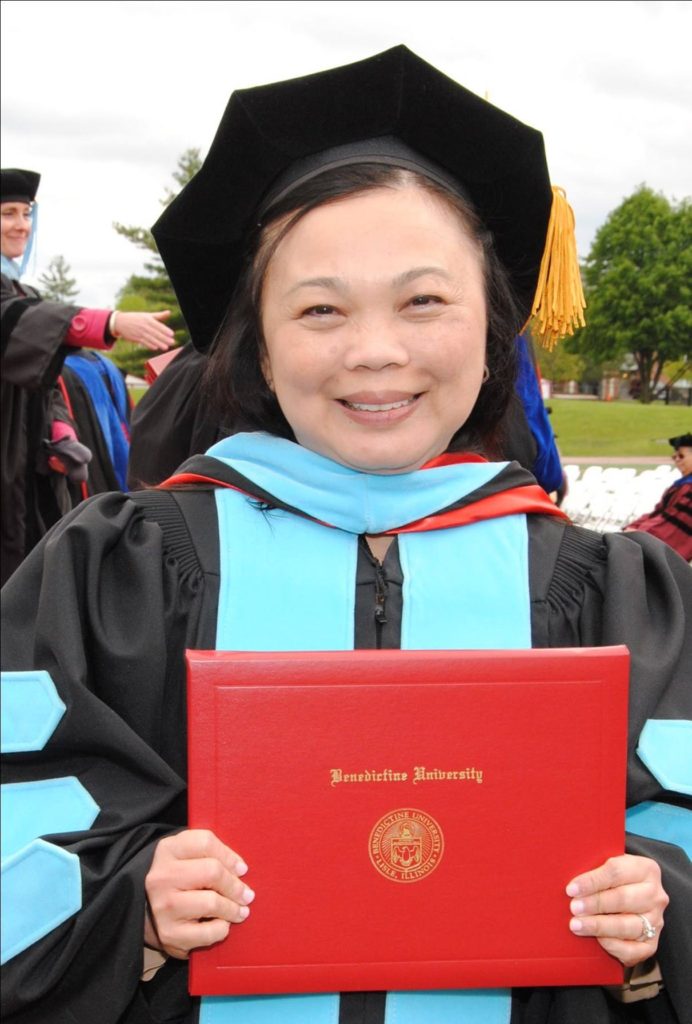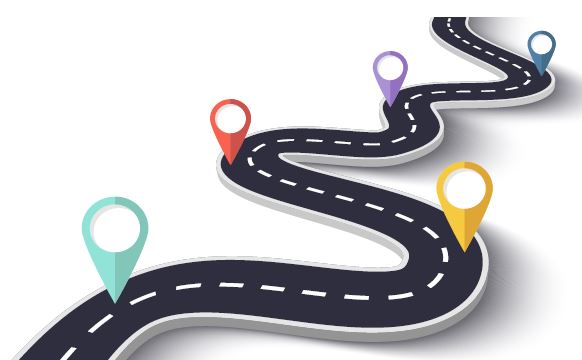After four years of rigorous schoolwork while working as a full-time assistant professor, I was physically and mentally spent when I started writing my doctoral dissertation. But despite this unimaginable exhaustion, I felt inspired, empowered, and euphoric because now, I could see the light at the end of the tunnel. I was almost at the completion of something I had worked so hard to accomplish. It took me almost a year to complete my dissertation while working overseas in Okinawa, Japan. I remember how writing the last chapter of my dissertation was the most challenging, as I was getting more impatient just to present and defend my research. Throughout this entire experience, I found my positive self-talk helpful each time I found myself unmotivated to get going: “Just try to write, even if it is just for a few minutes.” So, that was what I did.
I struggled with this dissertation at the worst time of my life. I was just about to start my dissertation when my mother’s health began to deteriorate. Almost three decades ago, I left my family in the Philippines, the people who had given me everything to be where I am today, to move to America. I felt obligated to take care of my mother. To be closer to her, I decided to take an overseas job and move temporarily to Okinawa, Japan. However, her condition turned worse, and she finally passed away after months of being in a vegetative state. To say that I was in a state of turmoil is an understatement.
 My parents never graduated from college, but they understood the value of education. They worked very hard to support us and never asked us to help them. For them, our only job was to go to school and obtain a college degree someday. My doctorate was my greatest tribute to my mother’s sacrifices for her children’s education, but she did not live long enough to see it. My grief made me temporarily lose my motivation. Grief is a very uncomfortable place to be stuck. It is so easy to get trapped in that paralyzing sadness. Many times, I had to convince myself not to give up: “Give it a go because you’ve come this far. Don’t give up.” This self-talk served me well when I almost lost all my will and determination to complete my dissertation. With the help of my family and academic advisors, I was able to deal with my sadness my way to be able to move on. Their understanding and patience allowed me to feel, say, and think whatever it was I needed to heal. In the end, my dissertation saved me and gave me back my focus.
My parents never graduated from college, but they understood the value of education. They worked very hard to support us and never asked us to help them. For them, our only job was to go to school and obtain a college degree someday. My doctorate was my greatest tribute to my mother’s sacrifices for her children’s education, but she did not live long enough to see it. My grief made me temporarily lose my motivation. Grief is a very uncomfortable place to be stuck. It is so easy to get trapped in that paralyzing sadness. Many times, I had to convince myself not to give up: “Give it a go because you’ve come this far. Don’t give up.” This self-talk served me well when I almost lost all my will and determination to complete my dissertation. With the help of my family and academic advisors, I was able to deal with my sadness my way to be able to move on. Their understanding and patience allowed me to feel, say, and think whatever it was I needed to heal. In the end, my dissertation saved me and gave me back my focus.
The road to success is not easy to navigate, even for the most talented people. Would I have predicted that my life would turn out this way three decades after my husband and I moved to America? No. I came from a rural area in Cebu, Philippines, a typical small town devoid of big city luxuries. I was shy as a child because I felt so insignificant. My past is consequential to who I am today. To remember my humble beginnings is important to me. My roots made me who I am today.
When I started my doctoral program, I was extremely excited but was also very intimidated. I felt intensely inferior to the other students because they all seemed smarter and better educated than I was. With English as my second language, academic writing did not come easy. My insecurities and self-doubts were the driving forces that made me work harder. I probably studied twice as hard and wrote twice as long as everyone else. I worked harder and longer to compensate for my shortcomings. I still remember how I struggled during my first course and how frustrating it was when I accidentally erased my paper and had to write another one. My will and determination helped me to overcome my fear of failing. Writing my dissertation has been the most demanding, exhausting, yet highly rewarding endeavor in my life. It was a long and arduous journey not just for me but also for my husband and sons who had supported me throughout the process. From my experience, it is easy to get lost along the way, procrastinate, and give in to distractions. But with perseverance and hard work, the finish line is attainable.
I will always remember what my father taught me to help me overcome my inferiority complex as a child: “The harder you work, the luckier you get.” My life would have been completely different if I took a different path 25 years ago. As a first-generation immigrant in the United States, I am proud that I have gotten this far. Of course, there were many hardships and setbacks, but there were also many successes in my life. The little successes I had slowly built my confidence so that over time, I started to believe that I could dream big.
It has been a year since the conferral of my doctoral degree. It was a transformative process for me, a self-discovery experience of how much I could persevere to accomplish something I consider worthwhile. My graduation was a life-fulfilling moment for me—an accomplishment of a lifetime that I am so proud and grateful. The experience made me realize that I am more than I ever thought I was. It changed me. I came out stronger and better. Although it was largely an intellectual endeavor, the physical endurance to multitask and the emotional resilience to persevere when life-changing events happen were critical elements that made my dream a reality. Because I overcame my fears and shortcomings, I came out more hopeful of what the future brings.
- Self-Reflection on My Dissertation Journey - December 21, 2017



